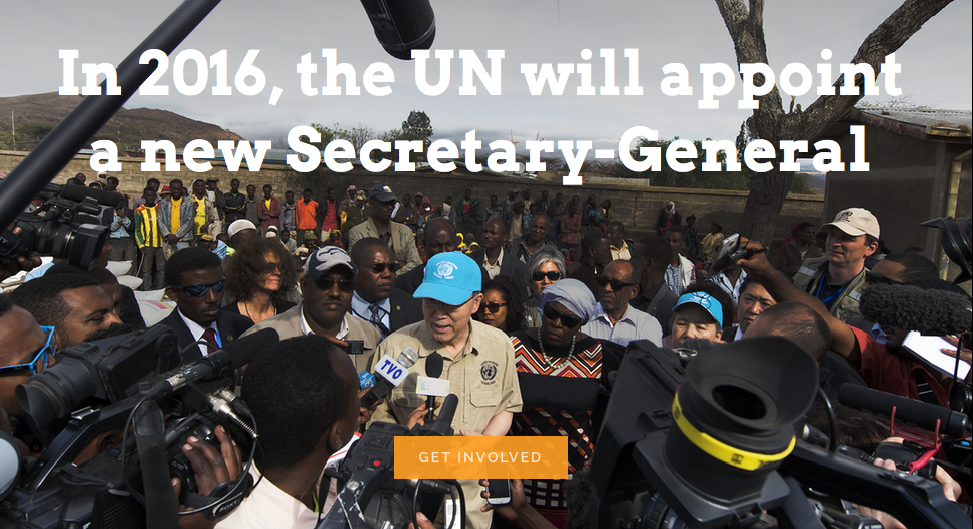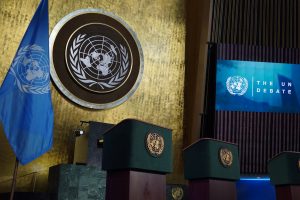President Thomson renewed the commitment President Lykketoft made to run his Presidency in the most open and transparent manner possible. This also applies to the process of selecting and appointing the next United Nations Secretary-General.
The position of Secretary-General is one of great importance that requires the highest standards of efficiency, competence and integrity, and a firm commitment to the purposes and principles of the Charter of the United Nations. The President of the General Assembly and of the Security Council invite candidates to be presented with proven leadership and managerial abilities, extensive experience in international relations, and strong diplomatic, communication and multilingual skills.
Member States are invited to present candidates in a letter to the President of the General Assembly and the President of the Security Council.
The Presidents of the General Assembly and of the Security Council will jointly circulate to all Member States, on an ongoing basis, and publish on this webpage, the names of individuals that have been submitted for consideration.
APPOINTED NEXT SECRETARY-GENERAL OF THE UNITED NATIONS (JANUARY 2017 – DECEMBER 2021)
Mr. António Guterres
Portugal
Official GA document A/70/768 – S/2016/206
Vision Statement of António Guterres
Informal dialogue with António Guterres [12 April 2016]
Civil society questions answered by António Guterres [12 April 2016]
Security Council Recommendation [7 October 2016]
Acceptance speech on appointment by General Assembly to the position of Secretary-General of the United Nations [13 October 2016]
Media stakeout of António Guterres [13 October 2016]
Informal meeting with the UN GA plenary [19 October 2016]
More information on the process
Selection procedure of next Secretary-General [15 Dec 2015]
Informal Dialogues and Civil Society Engagement with Candidates for next Secretary-General [25 Feb 2016]
The role of the Secretary-General
Appointment process & FAQ: Appointment process
Secretary General Selection – Informal Dialogues [29 Mar 2016]
Secretary-General Selection – Second round of Informal Dialogues [24 May 2016]
Consideration of candidacies for the position of next Secretary-General [15 June 2016]
Security Council Straw Polls on SG candidates [21 July 2016]
Letter from PGA to President of Security Council on SG-selection and appointment [13 September 2016]
Appointment of the Secretary-General – Security Council Recommendation [7 October 2016]
Appointment of the Secretary-General of the United Nations [11 October 2016]
Informal meeting of the plenary with the Secretary-General-designate [13 October 2016]
10 civil society questions for all candidates
Videos on selection process for next UN Secretary-General
Candidates
The letters submitted by Member States following the procedure laid out in the joint letter of 15 December 2015 for presenting candidates for the position of the next United Nations Secretary-General will be published below.
30 December 2015
Dr. Srgjan Kerim
Former Yugoslav Republic of Macedonia
Official GA document A/70/672 – S/2015/1054
Vision Statement of Srgjan Kerim
Informal dialogue with Srgjan Kerim [14 April 2016]
Civil society questions answered by Srgjan Kerim [14 April 2016]
14 January 2016 [Withdrawn]
Prof. Dr. sc. Vesna Pusić
Republic of Croatia
Official GA document A/70/687 – S/2016/40
Vision Statement of Vesna Pusić
Informal dialogue with Vesna Pusić [13 April 2016]
Civil society questions answered by Vesna Pusić [13 April 2016]
Withdrawal of candidature of Vesna Pusić [4 August 2016]
15 January 2016 [Withdrawn]
Dr. Igor Lukšić
Montenegro
Official GA document A/70/688 – S/2016/43
Vision Statement of Igor Lukšić
Informal dialogue with Igor Lukšić [12 April 2016]
Civil society questions answered by Lukšić [12 April 2016]
Withdrawal of candidature of Igor Lukšić [23 August 2016]
9 February 2016
Dr. Danilo Türk
Slovenia
Official GA document A/70/731 – S/2016/128
Vision Statement of Danilo Türk
Informal dialogue with Danilo Türk [13 April 2016]
Civil society questions answered by Danilo Türk [13 April 2016]
11 February 2016
Ms. Irina Bokova
Bulgaria
Official GA document: A/70/732 – S/2016/139
Vision Statement of Irina Bokova
Informal dialogue with Irina Bokova [12 April 2016]
Civil society questions answered by Irina Bokova [12 April 2016]
19 February 2016
Ms. Natalia Gherman
Republic of Moldova
Official GA document A/70/752 – S/2016/166
Vision Statement of Natalia Gherman
Informal dialogue with Natalia Gherman [13 April 2016]
Civil society questions answered by Natalia Gherman [13 April 2016]
29 February 2016 [Next Secretary-General-designate]
Mr. António Guterres
Portugal
Official GA document A/70/768 – S/2016/206
Vision Statement of António Guterres
Informal dialogue with António Guterres [12 April 2016]
4 April 2016
Ms. Helen Clark
New Zealand
Official GA document: A/70/813 – S/2016/314
Vision Statement of Helen Clark
Informal dialogue with Helen Clark [14 April 2016]
Civil society questions answered by Helen Clark [14 April 2016]
12 April 2016
Mr. Vuk Jeremić
Republic of Serbia
Official GA document: A/70/827 – S/2016/340
Vision Statement of Vuk Jeremić
Informal dialogue with Vuk Jeremić [14 April 2016]
Civil society questions answered by Vuk Jeremić [14 April 2016]
23 May 2016
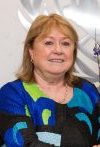
Ms. Susana Malcorra
Argentina
Official GA document: A/70/906 – S/2016/473
Vision Statement of Susana Malcorra
Civil society questions answered by Susana Malcorra [7 June 2016]
27 May 2016

Mr. Miroslav Lajčák
Slovak Republic
Official GA document: A/70/908 – S/2016/492
Vision Statement of Miroslav Lajčák
Civil society questions answered by Miroslav Lajcák [7 June 2016]
7 July 2016 [Withdrawn]

Ms. Christiana Figueres
Costa Rica
Official GA document: A/70/979 – S/2016/597
Vision Statement of Christiana Figueres
Civil society questions answered by Christiana Figueres [14 July 2016]
Withdrawal of candidature of Christiana Figuerres [13 September 2016]
29 September 2016
Ms. Kristalina Georgieva
Bulgaria
Vision Statement of Kristalina Georgieva
Civil society questions answered by Kristalina Georgieva [3 October 2016]
As part of a more open, transparent and inclusive selection and appointment process, UN-NGLS facilitated a call for questions from civil society that could be asked of UN Secretary-General candidates during UN General Assembly dialogues with the candidates. The first round of dialogues with nine candidates took place 12 – 14 April 2016. The second round of dialogues with two additional candidates took place on 7 June. A Global Townhall with ten candidates took place on 12 July in UN General Assembly Hall, broadcast live on UN WebTV by Al Jazeera media. A third round of UN General Assembly dialogues with one new candidate took place on 14 July, and a fourth with one final new candidate on 3 October.
UN-NGLS convened a civil society Committee through an application process to review all questions submitted and create short-lists for the Office of the President of the General Assembly to select from for inclusion in the General Assembly dialogues.
Civil Society Committee Members
Civil Society Committee Members
Joannes Paulus Yimbesalu – A World at School – Cameroon
Kate Lappin – Asia Pacific Forum on Women, Law and Development (APWLD) – Australia
Kashmiri Stec – AYUDH – Poland
Parsu Ram Rai – Blue Diamond Society – Nepal
Sabine Saliba – Child Rights International Network – Lebanon
Olumide Idowu – Climate Wednesday – Nigeria
Melina Lito – Equality Now – Albania
Volker Lehmann – Friedrich-Ebert-Stiftung – NY / Germany
Leonardo Párraga – Fundación BogotArt – Colombia
Mohammad Hassan Mashori – Fundamental Human Rights & Rural Development Association FHRRDA – Pakistan
Peter van Tuijl – Global Partnership for the Prevention of Armed Conflict (GPPAC) Netherlands
Mark Ross – Global Youth Movement – Guyana – Guyana
Angela Muthama – Human Rights and Information Forum – Kenya
Ben Homer – Innovation & Planning Agency – Austria / USA
Sandra Creamer – International Indigenous Womens Forum – Australia
Eleanor Openshaw – International Service for Human Rights (ISHR) – UK
Pefi Kingi – PACIFICWIN – New Zealand
Federica D’Alessandra – Public International Law & Policy Group Italy
Hugh Dugan – Seton Hall University, School of Diplomacy, Center for UN and Global Governance Studies – USA
Kirthi Jayakumar – The Red Elephant Foundation – India
Eleanor Blomstrom – Women’s Environment and Development Organization – USA INGO
Ritah Muyambo – World YWCA – Zimbabwe
Civil society was invited to contribute questions via Twitter or Instagram using #UNSGcandidates, or send them in via an online form using the link above. More than 1500 questions were submitted from over 100 countries Two to three questions from civil society were asked via video during each UN General Assembly dialogue with a candidate, and two were asked in person during the Global Townhall.
Additionally all candidates are asked to answer the same 10 selected civil society questions, which can be found here: 10 civil society questions for all candidates
All videos on next Secretary-General selection process:
First group – Leading the United Nations: A Global Townhall with UN Secretary-General candidates
[bc_video video_id=”5033028157001″ account_id=”1362235914001″ player_id=”d8dc81ba-3498-482f-a111-907a3f8bf583″]
Second group – Leading the United Nations: A Global Townhall with UN Secretary-General candidates
[bc_video video_id=”5033043853001″ account_id=”1362235914001″ player_id=”d8dc81ba-3498-482f-a111-907a3f8bf583″]



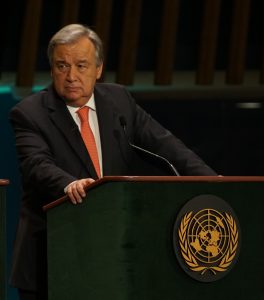
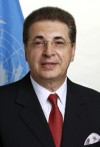
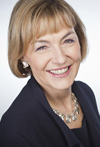
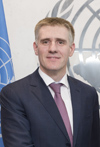
![Dr. Danilo Türk [Slovenia]](http://www.un.org/pga/70/wp-content/uploads/sites/10/2016/01/561333-e1455124653957.jpg)
![Ms. Irina Bokova [Bulgaria]](http://www.un.org/pga/70/wp-content/uploads/sites/10/2016/01/80306605-e1455215368182.jpg)
![Ms. Natalia Gherman [Moldova]](http://www.un.org/pga/70/wp-content/uploads/sites/10/2016/01/gherman-e1460038731759.png)
![Mr. António Guterres [Portugal]](http://www.un.org/pga/70/wp-content/uploads/sites/10/2016/01/658433-e1456861880321.jpg)
![Ms. Helen Clark [New Zealand]](http://www.un.org/pga/70/wp-content/uploads/sites/10/2016/01/Helen-Clark-headshot-e1460156274406.jpg)
![Mr. Vuk Jeremić [Serbia]](http://www.un.org/pga/70/wp-content/uploads/sites/10/2016/01/559639-e1460497675403.jpg)

